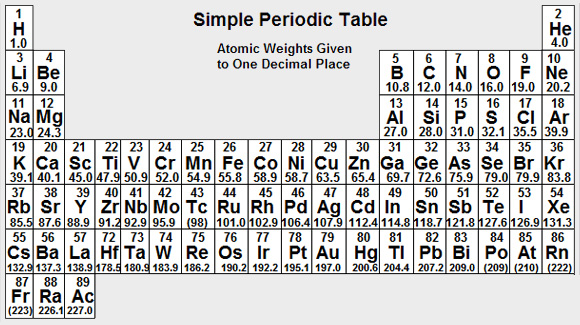For the next question, click on the Next Question button.
Question 1 of 3
You need to produce 28 litres of Methane (measured at 0°C and 760 mm Hg). If Hydrochloric Acid is present in excess, what is the MINIMUM amount in grams of Aluminium Carbide that you must use, assuming a percentage yield of 100 %. Answer to 1 decimal place. The reaction is as below:
-
Find the number of moles of Methane that you need to make.
Moles of Methane = Volume/22.4 moles
Moles of Methane = 28 / 22.4 = 1.25 moles -
Find how many moles of Aluminium Carbide you need.
From the balanced equation you can see that:
1 mole of Methane is produced from 1/3 moles of Aluminium Carbide. Thus:
1.25 moles of Methane are produced from 1.25 x 1/3 moles of Aluminium Carbide.
1.25 moles of Methane are produced from 0.41667 moles of Aluminium Carbide. -
Find the mass of Aluminium Carbide needed.
Mass of Aluminium Carbide needed = Moles x RMM RMM = 144.0
Mass of Aluminium Carbide needed = 0.41667 x 144.0 g = 60 g = 60.0 g to 1 dec pl
No, that is not the correct answer.
Have another go: just type in your new answer and press Enter.
If you continue to have problems, have a look at the answer.
For the next question, click on the Next Question button.
Question 2 of 3
You need to prepare 37.3 grams of Potassium Chloride. What is the minimum volume (in millilitres) of 2.000 M Potassium Hydroxide you would need if you were preparing Potassium Chloride using the following reaction:
-
Find the number of moles of Potassium Chloride to be produced:
Moles = Mass / RMM RMM = 74.6
Moles of Potassium Chloride = 37.3 / 74.6 = 0.5 moles -
Find how many moles of Potassium Hydroxide are needed.
From the balanced equation you can see that:
1 mole of Potassium Chloride is produced from 1 mole of Potassium Hydroxide. Thus:
0.5 moles of Potassium Chloride are produced from 0.5 moles of Potassium Hydroxide.
So, 0.5 moles of Potassium Hydroxide are needed. -
Find the volume of 2.000 M Potassium Hydroxide needed.
Molarity = Moles / Volume (in litres) Volume (in litres) = Moles / Molarity
Volume of Potassium Hydroxide = 0.5 / 2.000 litres = 0.25 litres
Volume of Potassium Hydroxide needed = 250 ml
No, that is not the correct answer.
Have another go: just type in your new answer and press Enter.
If you continue to have problems, have a look at the answer.
Question 3 of 3
How many grams of Ethanol would you need in order to prepare 36.3 grams of Ethyl Bromide, assuming a 100 % percentage yield? Answer to 2 decimal places.
-
Find how many moles of Ethyl Bromide are to be produced.
Moles of Ethyl Bromide = Mass / RMM RMM = 108.9
Moles of Ethyl Bromide = 36.3 / 108.9 = 1/3 moles -
Find how many moles of Ethanol are needed.
From the balanced equation you can see that:
1 mole of Ethyl Bromide is produced from 1 mole of Ethanol. Thus:
1/3 moles of Ethyl Bromide are produced from 1/3 mole of Ethanol.
Thus, 1/3 moles of Ethanol are needed. -
Find the mass of Ethanol needed.
Mass of Ethanol = Moles / RMM RMM = 46.0
Mass of Ethanol = 1/3 x 46.0 g = 15.333 g
Mass of Ethanol = 15.33 g to 2 dec pl
No, that is not the correct answer.
Have another go: just type in your new answer and press Enter.
If you continue to have problems, have a look at the answer.
